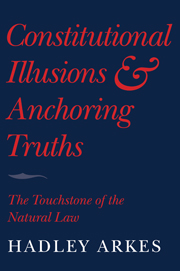Book contents
- Frontmatter
- Contents
- Acknowledgments
- INTRODUCTION: The Anchoring Common Sense and the Puzzles of the Law
- ONE On the Novelties of an Old Constitution: Settled Principles and Unsettling Surprises
- TWO The Natural Law – Again, Ever
- THREE Lochner and the Cast of Our Law
- FOUR The Strange Case of Prior Restraint: The Pentagon Papers
- FIVE Near Revisited
- SIX The Saga of Frank Snepp and the New Regime of Previous Restraints
- SEVEN And Yet…A Good Word on Behalf of the Legal Positivists
- EIGHT Conclusion and Afterword
- Index
- References
SEVEN - And Yet…A Good Word on Behalf of the Legal Positivists
Published online by Cambridge University Press: 05 June 2012
- Frontmatter
- Contents
- Acknowledgments
- INTRODUCTION: The Anchoring Common Sense and the Puzzles of the Law
- ONE On the Novelties of an Old Constitution: Settled Principles and Unsettling Surprises
- TWO The Natural Law – Again, Ever
- THREE Lochner and the Cast of Our Law
- FOUR The Strange Case of Prior Restraint: The Pentagon Papers
- FIVE Near Revisited
- SIX The Saga of Frank Snepp and the New Regime of Previous Restraints
- SEVEN And Yet…A Good Word on Behalf of the Legal Positivists
- EIGHT Conclusion and Afterword
- Index
- References
Summary
But then again…let me say a word on behalf of legal positivism. I say “then again,” because I have expended most of my slender arts as a writer over the last thirty years in making the case for natural rights and natural law. I have been part, that is, of a project, joined by some gifted writers in the academy, to restore the tradition of natural law, and work then against the current so dominant in our times. That current has been defined, of course, by moral relativism in forms now so familiar that most people are hardly even aware of them. Historians seem barely conscious of any vice of “historicism,” but they seem to fall easily into the assumption, for example, that the American Founders were men of their own age. The sentiments of the Declaration of Independence had stirred the souls of that age, and there is no gainsaying their deep political effect; and yet the historians understand, with a knowing wink, that the “self-evident” truths of the Declaration were merely the sentiments that summoned credence at the time. Almost no historian admits to believing, as Lincoln did, that the proposition “all men are created equal” was in fact, as the Founders thought, a self-evident or necessary truth, “applicable to all men and all times.” We find about us now, in the academy, students drawn almost entirely from families claiming to be Christian, Jewish, and Muslim, and yet most of these students are apparently persuaded, at the same time, that understandings of right and wrong must always be “relative” to the “culture” in which they are invented and sustained.
- Type
- Chapter
- Information
- Constitutional Illusions and Anchoring TruthsThe Touchstone of the Natural Law, pp. 225 - 253Publisher: Cambridge University PressPrint publication year: 2010

